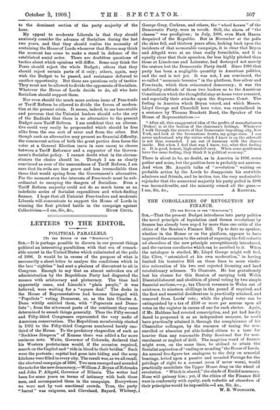[To THIS EDITOR OF THE " SPECTATOR:] Sin, — It is perhaps
possible to discern in our present things political an interesting parallelism with that era of remark- able unrest in the United States which culminated at the polls of 1896. It would be in excess of the purpose of what is necessarily a short letter to analyse the conditions which in the late " eighties " had sent a phalenv of discontent to sit in Congress. Enough to say that an almost unbroken era of administration by the Republican Party had disgusted the masses with aristocracy and plutocracy. The time had apparently come, and Lincoln's "plain people," it was believed, were waiting for a "square deal." The desks in the House of Representatives had become thronged with
Populists" voting Democrat, or, as the late Charles A. Dana wittily. entitled them, with "Popocmts and Demo- lists " ; from the uttermost parts of the continent they came determined to smash things generally. Thus the Fifty-second and Fifty-third Congresses represented the very nadir of American conservatism. The Republican membership elected in 1892 to the Fifty-third Congress numbered barely one- third of the House. To the predatory rhapsodies of such as
Sockless Simpson" of Kansas there was added a far more ominous note. Waite, Governor of Colorado, declared that his Western proletarians would, if the occasion required, march on the Capitol and "ride in blood to their bridles." Such were the portents ; capital had gone into hiding and the soup kitchens were filled in every city. The result was, as we all recall, the electoral campaign of 1896. Two men emerged and sounded the note for the new democracy,—William J. Bryan of Nebraska and John P. Altgeld, Governor of Illinois. The writer had been for some years on terms of intimacy with both these men, and accompanied them in the campaign. Everywhere we were met by vast emotional crowds. True, the party "barrel" was exiguous, and Cleveland, Bayard, Whitney,
George Gray, Cockran, and others, the "wheel horses" of the Democratic Party, were in revolt. Still, the alarm of "the classes" was prodigious ; in July, 1896, even Mark Hanna despaired of the Republic. But in November at the polls the skies fell, and thirteen years after, looking back upon the incidents of that memorable campaign, it is clear that Bryan and Altgeld were at no time really formidable, and it is equally clear that their speeches, far less highly pitched than those at Limehouse and Leicester, had destroyed not merely the orators but the Democratic Party itself. Since 1896 that party has been a negligible quantity in American politics, and the end is not yet. It was not, I am convinced, the so-called "economic heresies" in the platform, free silver and Free-trade, which then eviscerated democracy; it was the unfriendly attitude of these two leaders as to the American Constitution which the thoughtful stay-at-home voter resented, and especially their attacks upon the Supreme Court. The feeling in America which Bryan voiced, and which Messrs.
Lloyd George and Churchill here voice, was crystallised in a sentence by Thomas Brackett Reed, the Speaker of the House of Representatives :—
"After all, this exaggerated idea of the profits of manufacturers [Dukes] is at the bottom of the chairman's feelings. Whenever I walk through the streets of that Democratic importing city, New York, and look at the brownstone fronts, my gorge rises. I can never understand why the virtue which I know is on the sidewalk is not thus rewarded. I am out of harmony with the classes inside. But when I feel that way I know, too, what that feeling is. It is good, honest, high-minded envy. When some gentlemen have the same feeling, they think it is political economy."
There is about to be, no doubt, as in America in 1896, some pother and noise, but the position here is probably not anxious. And when Mr. Asquith talks of " revolution " waiting on probable action by the Lords he disappoints his erstwhile admirers and friends, and he invites, too, the very undesirable rejoinder that the numerical majority his party polled in 1906 was inconsiderable, and the minority owned all the guns.—


























































 Previous page
Previous page